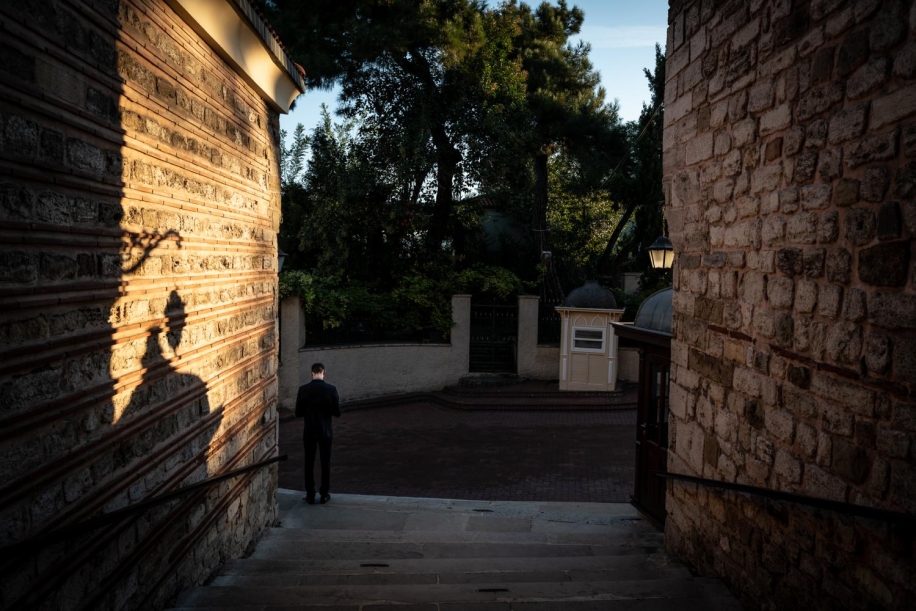
The Last Greeks of Istanbul
Ezio Gianni Murzi | Istanbul, Turkey
Photographer: Ezio Gianni Murzi
Exhibit Title: The Last Greeks of Istanbul
Location: Istanbul, Turkey
The Greek Christian Orthodox community of Istanbul, or more specifically, the Greeks, or Rumlars, trace their origins and their history back in that prestigious past when the Roman Empire extended its reach to Byzantium, and beyond.
Not to lose its own identity the community has clear references in His Holiness the Ecumenical Patriarch Bartholomew, and the religion. Orthodox churches in Istanbul are places of comfort and cultural identity enriched by the golden iconostasis, the complex liturgy, the golden regalia. These together with the language and the Greek alphabet set the community apart. The Greek language and alphabet preserve the community identity while isolating it.
Once prestigious Rumlars’ schools and lyceums continue to teach Greek and in Greek to some 100 pupils down from more than a 1500 of the past.
Today’s Rumlars do keep going opening cafès, and publishing houses. A Rum family with a two century history makes a living teaching and translating Greek classical literature into Turkish language.
Buildings may bear the scars of the past but everything is transformed and life takes its priority for the individuals more than for the community.
The Greek Christian Orthodox community of Istanbul, or more specifically, the Greeks, or Rumlars, trace their origins and their history back in that prestigious past when the Roman Empire extended its reach to Byzantium, Constantinople and beyond. The community in not too distant past has suffered persecutions and setbacks that have prompted population exchanges, migrations and deportations, making its current number close to 2500 people down from 20000 in 1920’s, or even higher numbers in earlier times.
Not to lose its own identity this Greek Christian Orthodox community has clear references in His Holiness the Ecumenical Patriarch Bartholomew, and the orthodox religion. Churches are places of comfort and of cultural identity that is enriched by the golden iconostasis, the complex liturgy, the chanting, the golden regalia — all are a cultural patrimony and together with the language and the greek alphabet set the community apart with its own specific identity. Language and alphabet are in fact intrinsically the knots to preserve the community identity while at the same time they may exclude others.
Once prestigious schools and lyceums continue to teach Greek and in Greek to some 100 pupils down from more than a 1000/1500 of the past.
Rumlars however, do keep going and now open cafès, and publishing houses, while a Rum family with a two century past history makes a living teaching and translating Greek classical literature into Turkish language.
Buildings may bear the scars of the past but everything is transformed and life takes its priority for the individuals more than for the community.
The Greek Christian Orthodox community of Istanbul, or more specifically, the Greeks, or Rumlars, trace their origins and their history back in that prestigious past when the Roman Empire extended its reach to Byzantium, Constantinople and beyond. The community in not too distant past has suffered persecutions and setbacks that have prompted population exchanges, migrations and deportations, making its current number close to 2500 people down from 20000 in 1920’s, or even higher numbers in earlier times.
Not to lose its own identity this Greek Christian Orthodox community has clear references in His Holiness the Ecumenical Patriarch Bartholomew, and the orthodox religion. Churches are places of comfort and of cultural identity that is enriched by the golden iconostasis, the complex liturgy, the chanting, the golden regalia — all are a cultural patrimony and together with the language and the greek alphabet set the community apart with its own specific identity. Language and alphabet are in fact intrinsically the knots to preserve the community identity while at the same time they may exclude others.
Once prestigious schools and lyceums continue to teach Greek and in Greek to some 100 pupils down from more than a 1000/1500 of the past.
Rumlars however, do keep going and now open cafès, and publishing houses, while a Rum family with a two century past history makes a living teaching and translating Greek classical literature into Turkish language.
Buildings may bear the scars of the past but everything is transformed and life takes its priority for the individuals more than for the community.
Make Comment/View Comments